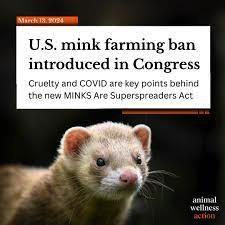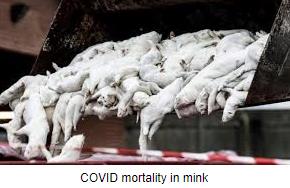 The Minks Superspreaders Act (MINKS) introduced into the 117th Congress in 2021 will once again be promoted with bipartisan support in the House. Sponsored by Rep. Nancy Mace (R-SC) and Rosa DeLauro (D-MA) and with support from House members from Texas, Pennsylvania, New York and New Jersey, the proposed MINKS are Superspreaders Act would prohibit the possession, transport and sale of captive farm-raised mink for fur production. In 2023 mink production will decline below one million animals from 50 farms. According to USDA, in 1966 there were 6,000 mink farms producing 6.2 million pelts annually. Almost all mink pelts produced in the U.S. are sold to China.
The Minks Superspreaders Act (MINKS) introduced into the 117th Congress in 2021 will once again be promoted with bipartisan support in the House. Sponsored by Rep. Nancy Mace (R-SC) and Rosa DeLauro (D-MA) and with support from House members from Texas, Pennsylvania, New York and New Jersey, the proposed MINKS are Superspreaders Act would prohibit the possession, transport and sale of captive farm-raised mink for fur production. In 2023 mink production will decline below one million animals from 50 farms. According to USDA, in 1966 there were 6,000 mink farms producing 6.2 million pelts annually. Almost all mink pelts produced in the U.S. are sold to China.
Concern over mink as a source of zoonotic viruses emerged with evidence that captive mink were susceptible to SARS-CoV-2 with animal-to-animal transmission and the emergence in Scandinavia of strains with mutations pathogenic to humans. Additional evidence of mink as a potential generator of zoonotic viruses was evidenced by H5N1 avian influenza on a mink farm in Spain in 2023.

The potential for an emerging epidemic from farmed mink is realistic and the persistence of this anachronistic segment of livestock production imposes a risk that is disproportionate to the potential benefits to the U.S. agricultural economy.
Despite the legislative burden faced by the 118th Congress it is hoped that the MINKS Superspreaders Act will be considered as a bipartisan non-contentious bill with expedited passage through both the House and Senate without narrow parochial considerations and lobbying obstructing enactment.